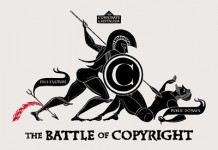 Rights are more important than ever in the digital publishing world of today. In that respect, it’s not surprising there would be a conference devoted entirely to managing rights to digital media. On Publishing Perspectives, Porter Anderson summarizes a number of panels that took place there. I found the content of the panels as communicated in Porter’s summaries as interesting for what they implied as for what they said.
Rights are more important than ever in the digital publishing world of today. In that respect, it’s not surprising there would be a conference devoted entirely to managing rights to digital media. On Publishing Perspectives, Porter Anderson summarizes a number of panels that took place there. I found the content of the panels as communicated in Porter’s summaries as interesting for what they implied as for what they said.
First up was Authors Guild President Roxana Robinson, discussing the trouble authors are having getting paid when many of their titles are remaindered and end up competing with new copies on Amazon. “Publishers have high hopes for every book they make, they make more copies than can sell,” Robinson explained, and sell those titles through middlemen who in turn sell them on Amazon—and the publisher’s contract permits them to do this without paying royalties to the author. So they do it, because they want money.
If Robinson had any harsher words for the publishers in attendance about this practice, Anderson didn’t report them. The odd thing, though, is that she even brings it up in the context of rights management issues in the new digital world, given that publishers have been remaindering books since before Amazon was even a twinkle in Jeff Bezos’s eye. I well remember going into Waldenbooks as a kid in the 1980s and finding remaindered tables there. Yes, sure, Amazon is digital, but it’s simply a continuation of those same non-digital bookstore practices. The only difference is now all the copies of each book are right next to each other, instead of being kept in separate parts of the store.
Then Randy Petway from Ingenta spoke, reminding publishers they need to take care of their authors or the authors will “step out of the business as a whole or they’ll find alternate channels, to be able to sustain an income.” They might even “[become] an adversary” if they feel publishers aren’t doing enough to protect their rights. Hence, publishers need to audit their rights portfolio and incorporate new rights-tracking technology to let their rights department be able to respond to queries “without the whole department coming to a screeching halt.”
“Alternate channels,” huh? Sounds an awful lot like Petway was talking about self-publishing there.
Michael Healy, Executive Director of International Relations with Copyright Clearance Center, doesn’t seem to look too happily on various places around the world that are looking at broadening “fair use” protections in educational and library settings. He notes that, in Canada, licensing revenue has fallen from several million dollars a year to “almost zero” since Canada has adjusted its copyright licensing regime. Calling this the “Canadian flu,” Healy notes that it’s happening more and more frequently around the world.
In many of the challenges to copyright Healy sees, publishers simply aren’t considered legitimate rights-holders. “Taken in aggregate, these are serious situations,” he said, describing “multi-pronged assaults on copyright.”
HarperCollins Global Strategy Director Kerry Saretsky discussed the sort of careful planning and cooperation necessary to launch a book across multiple territories—using the Go Set a Watchman release, which required 18 different regional international teams, as an example.
Two of the tips that Kliemann provided: (1) Get past paper contracts if at all possible—it’s time for publishing to move to electronic signatures and digitally formatted contracts. (2) Watch for which titles in a backlist are getting permissions requests—those are clues to potential rights to be exploited.
I’d venture to suggest that “exploited” probably isn’t the best term to use there. It’s probably meant here as a neutral term describing making of the most of an opportunity, but the more familiar usage of the word means someone is profiting at the expense of someone else—and too many authors and readers feel that way about publishers already.
A few other interesting tidbits to come out of the conference:
- Hollywood is now more interested than ever in licensing backlist works, given the advent of Netflix and Amazon as sources for original programming.
- It can be tricky to promote literary writing online because you need millions of users to attract enough ad revenue. Patreon and Kickstarter can help bring revenue in.
- Inkshares is another crowdsourced publisher (which we’ve previously covered here and here) which publishes books once they reach 250 pre-orders, with a 50% e-book and 70% print revenue share going to the author.
- Getting digital music onto Spotify doesn’t mean a lot without the help of a label that can get songs onto its home page. Even then, the amount of revenue coming in will be tiny.
So, that’s that. It’s kind of a funny thing, but given that the conference was about rights management in a digital world, I didn’t see any mention, except implicitly, of DRM—which is commonly understood to mean “Digital Rights Management.” It’s too bad that this lack of mention probably just means everyone takes it for granted now.
As I already noted, it’s also funny that Roxana Robinson brings up the issue of remaindering in the context of something that’s an issue in the here and now. Not only is it not new, it absolutely should be an issue in the here-and-now, but not for the reasons Robinson represents. Remaindering is an artifact of a much earlier era, when publishers didn’t have any good way to estimate or count the number of sales that were being made, so they just had to take their best guess and accept that some waste was going to happen.
We have much better technology now. We should be able to forecast demand a lot better, and print a lot closer to the exact number of copies needed. With print-on-demand technology, some titles might not even need full print runs at all. If publishers were only willing to modernize their operations, they could put remainders dealers out of business by drying up their supply—and save a lot of warehouse space, to boot. Remainders could become a thing of the past—and for that matter, so could pulping returned books, another decades-old practice that is only wasting energy and helping contribute to global warming.
But publishers would need to modernize their warehousing operations, and recent events demonstrated those are still stuck in the past, too. When Amazon reduced the inventory of Hachette titles it kept on hand, Hachette proved not to be up to the task of getting new batches of books shipped out in a timely manner. Its warehouse system wasn’t up to keeping pace with demand, because it never had to before—Amazon and other distributors took care of that. But that sluggish response is also part and parcel of what’s keeping publishers stuck on printing more books than they need, then selling their overstocks to compete with themselves.
Randy Petway’s presentation does reflect the way publishers are coming to realize that self-publishing is a serious competitor, even if they don’t want to mention it by name. It’s funny, though, that he thinks authors are focused so intensely on their rights. Perhaps they are, but only because that’s a means to an end—the end of getting paid more money.
Michael Healy’s emphasis on fighting copyright reform, and his complaint that publishers aren’t considered legitimate rights-holders, seems to be another reflection of what’s wrong with the modern publishing industry. Of course publishers shouldn’t be considered rights-holders; they’re just rights borrowers. The author is the one who should hold the rights. But then, given the way many contracts assign the publisher the rights for the duration of copyright—for decades after the author passes away—many publishers seem to disagree. It’s hardly a surprise that publishers and their partisans would be upset that people might get more latitude in how they use copyrighted material, given that license fees are how they make their money.
As for Kerry Saretsky and Go Set a Watchman, yeah, it’s great that blockbuster titles get that kind of roll-out. But how much money do they spend pushing the books of Joe Random Midlist Author? “Oh hey, here’s a Facebook account. Go crazy with it!” And all this for a book that probably should never have been published in the first place! Maybe “exploit” is the right word after all.
Will big publishing ever change? Maybe, eventually, if it finds it can no longer survive without it. Until then, it’s still living several decades in the past and desperately trying to see and hear no evil.

































Publishers aren’t the rights-OWNERS. But since they have bought a license to the rights, they are the rights-HOLDERS, until the term of that license ends.
The word was created to describe something different than ownership or borrowing or even custody.
As for publishers and POD: they use POD printing all the time, and have for decades. But it’s a judgment call, still, to decide how many more copies will sell. Below a certain sales velocity, POD costs too much, even accounting for the drop in risk and the time value of the investment in inventory. Above that trigger point, you want to print offset. Below it, you want POD.
Remainders exist because no one, not anyone anywhere, can really tell how many copies which book will sell in how long. And worse, the people with the most data don’t share it.
Your comments about warehouse operations and printing too many books are like other articles that say, “Amazon is much better at forecasting sales than the publishers are. The publishers should just follow what Amazon tells them.”
It is confusing two issues, namely stock-keeping over the short-term (perhaps a week or two) and forecasting for the most significant part of the lifetime of a book (perhaps the first year or two).
Retailers expect to be able to order small quantities of stock from the publisher or their distributor and have it delivered within a few days or less. If demand changes they can adjust the quantities quickly and easily and reorder. For unpublished titles it’s harder but again they can quickly change the quantities after publication date if the figures prove to be wrong. Amazon complains if a supplier doesn’t have enough stock on hand to fulfil its orders and almost certainly reduces the visibility of those products.
Publishers have to decide in advance how many to print. They can’t sell what they haven’t printed and it’s comparatively cheap to print extra.
So it’s the publisher that has the difficult task and takes the risk. It’s especially difficult for unknown authors.
(Amazon had a similar problem deciding how many Fire phones to make).
POD is a solution in some situations but by no means all and as Marion says, this isn’t news to the publishers.
And let us not forget that the difference in cost between POD printing and offset printing in long runs is larger than the contribution margin on many books.